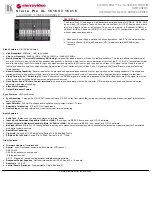
If a power supply system is equipped with a leakage protector (also referred to as "leakage current switch" or
"leakage current breaker"), the rated leakage action current of each leakage protector is greater than twice of the
theoretical maximum leakage current of all the power supplies in the system. For example, if a system is equipped
with sixteen identical power supplies, the leakage current of each power supply is equal to or less than 3.5mA, and
the leakage current of the system totals 56mA. A leakage protector with 30mA rated action current supports less
than five power supplies (that is, Action current of the leakage protector/2/Maximum leakage current of each power
supply =30/2/3.5
≈4.28). In other words, the leakage protector with 30mA rated action current supports no more than
four power supplies. In this case, the sixteen power supplies in the system require at least four leakage protectors
with 30mA rated action current and each leakage protector supports four power supplies. If power supplies in a
system differ in models, the rated leakage action current of each leakage protector divided by two is greater than the
sum of maximum leakage current of all the power supplies. The rated leakage non-action current of a leakage
protector shall be 50% of the leakage action current. Take a leakage protector with 30mA rated leakage action
current as an example. The rated leakage non-action current shall be 15mA. When the leakage current is below
15mA, the protector shall not act. Otherwise, misoperation may easily occur due to high sensitivity and thus the
leakage protector trips, devices are powered off, and services are interrupted.
To guarantee personal safety, the rated leakage action current of each leakage protector in the system must be
equal to or less than 30mA (human body safety current is 30mA). When twice of the total leakage current of the
system is greater than 30mA, the system must be equipped with two or more leakage protectors.
For the leakage current value of each power supply model, see the power supply model parameter table in Chapter
1.
2.1.4 Static Discharge Damage Prevention
To prevent damage from static electricity, pay attention to the following:
Proper grounding of grounding screws on the back panel of the device. Use of a three-wire single-phase socket with
protective earth wire (PE) as the AC power socket.
Indoor dust prevention
Proper humidity conditions
2.1.5 Laser
The RG-S2910XS-E series switch supports varying models of optical modules sold on the market which are Class I laser
products. Improper use of optical modules may cause damage. Therefore, pay attention to the following when you use
them:
When a fiber transceiver works, ensure that the port has been connected with an optical fiber or is covered with a
dust cap, to keep out dust and avoid burning your eyes.
When the optical module is working, do not pull out the fiber cable and stare into the transceiver interface or you may
hurt your eyes.
Do not stare into any optical port under any circumstances, as this may cause permanent damage to your eyes.
















































